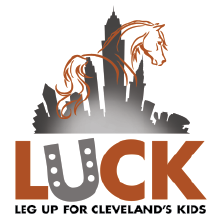Andrea Gale & Laura Hammel
Last week, the article, “Breaking the Silence Surrounding White Privilege in The Horse World,” stirred heated dialog about the sport on COTH’s social media platforms. Likewise, images of mounted police horses engaged in protests have triggered emotions. But, have we thought about what horses symbolize to many urban kids of color? Suppression, entitlement, privilege, and the unattainable social stratosphere. In her famous poem, Alice Walker said, “Horses make a landscape look more beautiful.” How many urban kids get to see those landscapes, much less positively interact with those horses? Most urban kids are spectators of a sport we engage in. They ask, “How could I ever do that?” Leg Up for Cleveland’s Kids (LUCK) was founded to answer that question.
LUCK is a four-year-old program in Cleveland, Ohio. It is replicated, in part, on the very few urban equestrian programs that exist in the U.S.—Compton Jr. Posse, Work to Ride, Detroit Horse Power, to name a few. Founded on the following premises, LUCK first provides urban youth access to equestrian sports as a mitigation for trauma. Second, LUCK provides social capital by enabling urban teens to meet and forge relationships with influential people in the city. In fact, LUCK participants have been hired by trainers, apprenticed in trades of the equestrian industry, explored interests in becoming mounted police, been trained to handle horses on the ground, and shown successfully in A-rated horse shows. Third, LUCK allows urban teens and mounted police officers to interact using horses as a bridge to communication.
LUCK is not a therapeutic riding program. Most traditional therapeutic riding programs are conducted in ways that define the population served as “less than.” In other words, “you” have a deficiency and that is why “you” get to work with horses and be healed, but “you” need us (the agency) to do that for “you.” Additionally, urban students in traditional programs are bused to facilities in the suburbs or the country, intimating that they are allowed access because there is a determination of need. This need is often based on deficiency or if “we” allow it. This method suggests that a participant’s access can be taken away for a variety of reasons: loss of transportation, changing schools, or being “diagnosed” as not “needing” the therapy. LUCK’s philosophy flips this premise on its head.
LUCK’s monthly programs are free of charge. No preteen or teen is turned away. To increase access to our program, we are in the process of building a stable in downtown Cleveland. This setting will prove that our program belongs to the children in the City of Cleveland. In this environment, if they choose, they can learn about horses, help train horses, and participate in riding programs. Thus, LUCK’s message is one of empowerment for the 10 – 18-year-old, able-bodied, at-risk students attracted to our programs. LUCK lets them know, loudly and clearly, that we need them as much as they need us. The horses are the ambassadors to a world of challenges to be met and mastered. Through interacting with them, our participants’ social and emotional needs are met.
Despite the benefits our program provides, LUCK struggles for funding. The program is unique, necessary, and builds capacity in a sport that needs young people of many cultures and classes in the saddle. In-kind donations have been generous and plentiful. We have received riding clothes, tack, the use of horses, and riding facilities. Unfortunately, monetary donations have not allowed us to move forward to match supply with demand. LUCK looks to create a legacy that makes horse sports accessible to individuals who will pass the torch to others once they have acquired the means to do so. Once we have secured the necessary funding, we can build the barn and continue to answer the question of, “How can I ever do that?” with the response of “Come meet the horses of LUCK.”
Other ways to benefit children In your area are to support existing urban equestrian programs or create one of your own. If you are interested, LUCK is happy to help you develop a strategic plan. Please don’t hesitate to reach out at info@luck4kids.org.
Andrea is an English teacher at Cleveland Metropolitan School District, LUCK board member, and lifelong horsewoman. Laura is a professor at Notre Dame College in Cleveland, OH, founding member of LUCK, and mother of a lifelong horsewoman.
